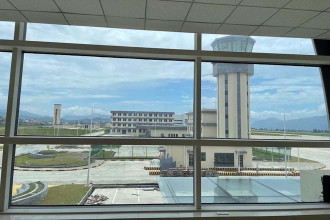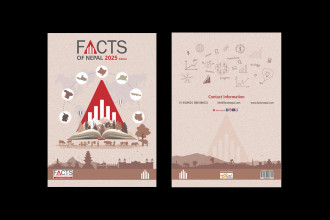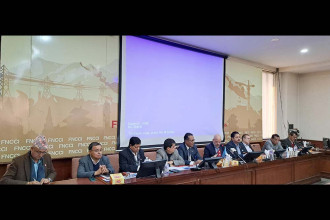KATHMANDU: Informal cross-border trade, particularly in agri-food commodities, remains a significant facet of the South Asian region.
The experts agreed that informal cross-border trade is enabled as trade transaction costs for using the formal channels are higher than the risk and cost of circumventing formal channels for imports and exports in the region. They also pointed out that such informal exchanges offset the policies and become a source of ineffectiveness for domestic policies during a workshop organised in Kathmandu, on Thursday.
South Asia Watch on Trade, Economics and Environment (SAWTEE) in partnership with the International Food Policy Research Institute (IFPRI) organised a workshop titled 'Insights into Informal Cross-Border Trade in Agri-Food Commodities in South Asia' to disseminate the findings of their study that examined the dynamics of informal trade in agri-food commodities. The workshop centred on the dynamics of informal trade in agri-food commodities between Nepal and India, and India and Bangladesh, shedding light on the nuances of trade patterns, modes, and underlying drivers.
Dikshya Singh, Programme Coordinator of SAWTEE, highlighted in her presentation that evasion of tariffs and duties, variation in prices and bans on import and export serve as key drivers of informal trade. Singh said that informal trade is highly responsive to India’s ban on exports and price variations as the result of different production costs on the Nepali and the Indian sides and tariffs in the case of products such as rice and vegetables. The study found that prices of rice across the border markets could be as high as 20%.
Informal trade of agri-food commodities, including inputs, has increased access to those products preventing shortages and spikes in prices but that undermined the productive capacity of Nepali goods and diminished their competitiveness, she pointed out.
As per findings from the IFPRI study on informal trade in agricultural goods between Bangladesh and India, prominent items include edible oils, rice seeds, tea, fertiliser, soybean oil, and palm oil. The study reveals that this informal trade is dominated by a small group of traders forming an oligopoly. Moreover, the study indicates that large-scale informal trade is controlled by mafia-style syndicates with political backing.
Mamata Pradhan, Research Coordinator at IFPRI, highlighted during her presentation the robust nexus between trade and finance, facilitated by the hundi system of informal international money transfers, which significantly bolsters informal trade between India and Bangladesh. She also mentioned that 80% of carriers in the informal trade are women as most of the border points have no women security personnel at the India-Bangladesh border.
Posh Raj Pandey, Chair Emeritus, SAWTEE, highlighted that obstruction in the entry and exit of products, policy disruption at the domestic level and weak law enforcement at the border contribute to informal trade in Nepal. Pandey emphasised the necessity of reducing trade transaction costs to mitigate informal trade, advocating for measures such as enhancing trade facilitation, improving border infrastructure, and minimising tariff barriers.
Anand Bagaria, Managing Director of Nimbus Holdings, stressed the importance of adopting a measured and proactive strategy towards policymaking in dealing with informal cross-border trade. Since we cannot influence our neighbouring countries’ policies, Nepal needs to be clear about what could be the right balance between inflation, government revenue and mitigating quality-related risks while adopting a corrective approach to deal with informal trade, he added. Additionally, Bagaria acknowledged the inherent challenges in halting informal trade at the household consumption level while highlighting the role of policy in regulating commercial consumption.
Drawing parallels with Africa, where central banks conduct surveys on informal trade, Ramesh Sharma, Senior Economist, formerly with FAO, Rome, made a point on the potential role of the Nepal Rastra Bank and the National Statistics Office in measuring informal trade periodically. Sharma highlighted the importance of leveraging existing resources while preparing Nepal’s food balance sheet. He further suggested that the Nepal Rastra Bank, along with the Ministry of Industry, Commerce, and Supplies, and the Ministry of Agriculture and Livestock Development (MoALD), could collaborate to facilitate trade and minimise informal trade practices.
Sabnam Shivakoti, Joint Secretary at the MoALD, emphasised the significance of rules and regulations within the border control mechanism to address sanitary and phytosanitary issues in agri-food commodities. She said that such concerns should not pose obstacles, as the repercussions of neglecting them can be more costly as they are legitimate measures to ensure that harmful pests and diseases are prevented from entering our territories. Additionally, Shivakoti pointed out that cross-border trade that was done traditionally due to social ties across borders is not the same as the organised commercial informal trade that is happening now at a large scale that affects agriculture as well as industrial sectors as they have to compete with cheap imports. She cited the example of the import restriction of dairy products that was announced in February 2024 to protect domestic farmers and the dairy industry but that led to formal imports being diverted to informal channels.
Participants at the workshop included policymakers, private sector representatives, representatives of farmers’ organisations, members of civil society and experts.






